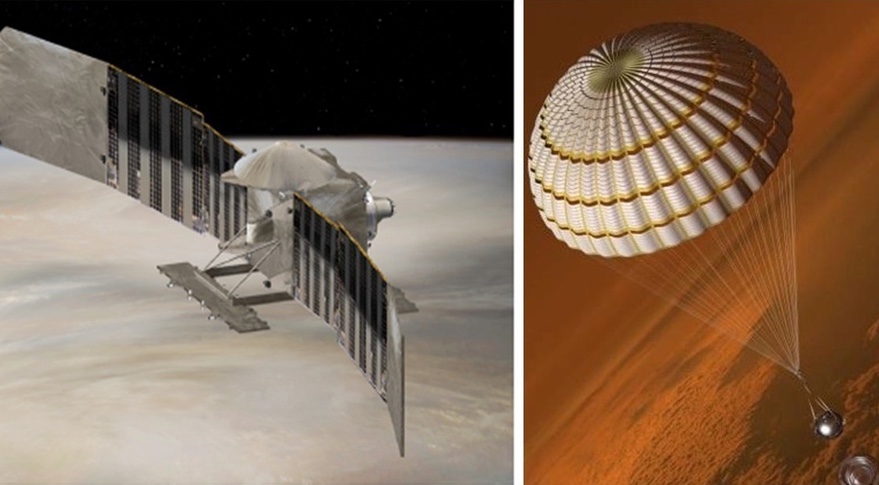WASHINGTON — For the first time in more than three decades, NASA has announced it will send a robotic mission to Venus, selecting two proposals in the latest round of its Discovery program.
NASA Administrator Bill Nelson announced at the end of a “State of NASA” speech at NASA Headquarters June 2 that the DAVINCI+ and VERITAS missions will launch to Venus in the late 2020s, having beat out competing proposals for missions to Jupiter’s volcanic moon Io and Neptune’s large moon Triton that were also selected as finalists in early 2020.
“These two sister missions both aim to understand how Venus became an inferno-like world capable of melting lead at the surface,” Nelson said. “They will offer the entire science community the chance to investigate a planet we haven’t been to in more than 30 years.”
DAVINCI+, or Deep Atmosphere Venus Investigation of Noble gases, Chemistry, and Imaging, will send a probe into the planet’s atmosphere, measuring noble gases and other elements that can provide information on how its runaway greenhouse effect developed. Cameras on the descent probe will provide high-resolution images of geological features known as “tesserae” that may be similar to Earth’s continents.
VERITAS, or Venus Emissivity, Radio Science, InSAR, Topography, and Spectroscopy, will map the planet from orbit using a synthetic aperture radar system. It will also search for infrared emissions that could help scientists determine if there is active volcanism.
“It is astounding how little we know about Venus, but the combined results of these missions will tell us about the planet from the clouds in its sky through the volcanoes on its surface all the way down to its very core,” said Tom Wagner, NASA’s Discovery program scientist, in a statement. “It will be as if we have rediscovered the planet.”
DAVINCI+ will be led by NASA’s Goddard Space Flight Center, while VERITAS will be run by the Jet Propulsion Laboratory. Lockheed Martin will build the spacecraft for both missions.
Each mission has an estimated cost of $500 million, with launches expected between 2028 and 2030. Launch contracts will be awarded later in each mission’s development.
In a briefing with reporters after the State of NASA speech, Thomas Zurbuchen, NASA associate administrator for science, said all four proposals, including the Io Volcano Observer and Trident mission to Triton, rated well. “This is not the case where one of these missions had a massively bigger risk. It’s not the case that one of them was ground-ruled out in some way,” he said.
While both DAVINCI+ and VERITAS are going to Venus, he noted that the two missions are “massively different” in their science, one focusing on the atmosphere and the other the surface. “In the end, those two swung, in terms of science return and programmatic match, to the top,” he said. “Those were the best missions, and that’s why we selected them.”
The two winning missions are updated versions of proposals that were finalists in the previous round of the Discovery program. NASA instead selected two asteroid missions, Lucy and Psyche, in early 2017.
Having been through the competition before helped DAVINCI+ and VERITAS. “I hardly recognized the proposal,” he said of VERITAS in particular. “The science was just so much better. The ratings were so much better than the previous round.”
Both missions will host technology demonstrations in addition to their primary science payloads. VERITAS will host an updated version of a deep space atomic clock first flown on an Earth-orbiting spacecraft in 2019 that will assist in radio science observations and autonomous spacecraft maneuvers. DAVINCI+ will fly a new ultraviolet imaging spectrometer.
The missions will be the first NASA missions dedicated to Venus since the Magellan radar mapper orbiter, launched in 1989. Magellan’s mission ended in 1994, and while scientists have been able to participate in European and Japanese Venus orbiter missions, or take advantage of limited observations by other spacecraft flying by Venus, many researchers had been advocating for years for a new Venus mission.
“In the science community, I can tell you, this is resonating,” Nelson said in the post-speech briefing. “They’re excited about this.”
Other countries and even private ventures are planning missions to Venus. Russia has been working for several years on a mission concept called Venera-D that includes an orbiter and lander, which could feature some NASA participation. India is developing a Venus orbiter mission called Shukrayaan scheduled for launch in 2024. The European Space Agency is considering a Venus orbiter called EnVision for its next medium-class mission.
Perhaps most intriguingly, Rocket Lab, the small launch vehicle and smallsat developer, has been leading efforts to send a small mission to Venus. That mission has been motivated in part by the potential discovery of phosphine in the planet’s atmosphere, a gas that could be evidence of life. Scientists announced in September 2020 the potential detection of phosphine based on analysis of ground-based infrared and microwave observations, but other scientists have questioned that detection.
Peter Beck, Rocket Lab’s chief executive, has said on numerous occasions that the company is working on a smallsat mission that would plunge into the atmosphere to search for phosphine or other biosignatures. That could launch as soon as 2023, although the company has provided few details about the mission’s development.
“Venus is the most underrated planet in our solar system,” he said during a May 27 webinar by Bessemer Venture Partners, citing the potential lessons from that planet’s runaway greenhouse that could apply to Earth. “I think we can learn a tremendous amount, scientifically, from Venus.”
